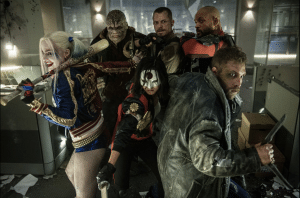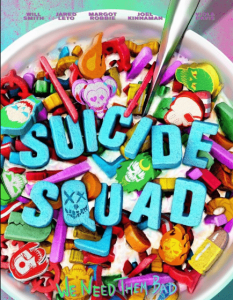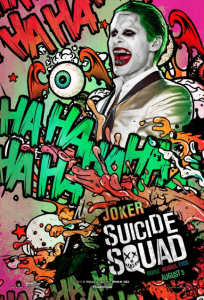Suicide Squad was not the film I wanted it to be. I am not surprised by that—I knew that was never an option. But the film I wanted it to be is somewhere inside the film that I actually saw, and that makes an analysis difficult. (For another perspective of this film, check out Jason’s review).
What Went Wrong With Suicide Squad: A Nerds On Earth Autopsy
The general consensus is that Smith, Robbie, and Davis are the standouts, and I’ll agree to a point—I actually found Robbie a little inconsistent, with her “Mistah J” accent slipping just often enough for me to notice whenever it made an appearance. In fact, I thought Suicide Squad was a generally well-acted film, at least whenever the characters were allowed to do anything other than glower and pose.

The characters were always going to be the make or break, and there are just too many. For an ensemble movie like Suicide Squad that was always going to be the case. But even so, the movie could have done better. It tries to do so much, and even it has no idea what it’s doing. Yes, Slipknot was introduced solely to demonstrate the efficacy of the neck bombs, but could he have been introduced with the rest of the team? What was the point of Katana, anyway? What service did she provide?
David Ayer wrote and directed this film, but you wouldn’t know it from the inconsistent tone and frankly baffling editing choices. This film stinks of studio interference, repeating and retreading scenes and introductions. There are no clear stakes, no clear mission. If they were sent into the city to save Waller, why have a world-ending threat in the first place? Enchantress added literally nothing to the story—she was in there to justify the formation of the team, but there wouldn’t have needed to be a team without her. What would have been wrong with a terrorist attack? Or a Joker[1] strike? Boom, two birds.
What, Exactly, Am I Watching?
Much has been made of the soundtrack of the film, on-the-nose needle drops that bludgeon the viewer over the head with their single-entendre symbolism, 45 seconds at a time. This is the first perfect metaphor for this film—small tastes of something genuinely cool, only to whiplash into something completely different immediately.
There are two movies here, and they can be identified with their soundtracks. There is a dour, serious war film, in the vein of Saving Private Ryan or Fury, characterized by a cinematic, sweeping score. The endless (and it truly borders on self-parody the number of licensed songs this movie uses) parade of hits identifies the slick neon of the stylish heist movie that Ayer should have made, the anti-hero slugfest that we were sold on. That’s the way the movie starts—goofy fonts, bright colors, and for a second, we have hope that this was the movie they said it was going to be.

I can’t emphasize that enough. Say what you will about the apocalyptically bad Batman v. Superman, but we knew what we were getting into. The promotional materials, the trailers, even the breakfast cereal, all told us exactly what kind of movie we were about to watch.
But we were told that Suicide Squad was going to be bright, violent, rude, and funny.
It is not.
What It Would Have, Could Have, And Should Have, Been
Should’ve, should’ve, should’ve. There was a good idea here. A lot of good ideas, actually[2]. And the cast did the best they could with what they had. But like the sickening toxic waste fire that was Batman v. Superman, there were so many confusing decisions that all of the good ideas were completely suffocated. That’s what’s so frustrating. I can see a good (or at least entertaining) movie in here somewhere.
Here, let me try: Take out the entire Enchantress subplot, or sublimate it; June Moone is in a coma, and Amanda Waller (who possesses the magic heart) is the only one who can break her out of her spell. There you go, that’s why Flagg (who should have been wearing a yellow shirt) has to participate.
Open on Deadshot’s first assassination. Cut out the dinner scene, have the dossier be read at the DoD meeting. Massive chemical attack on Midway City, terrorists! Better yet, the Joker[3] (that’s why Waller sends Harley, which fits perfectly with her MO of pitting people against each other)! The Squad sent in to clean up! Katana is out. Slipknot, who is given more than a single line, still gets his head blown off, sure—that’s actually canon.

Look, that’s rough and full of holes, I know. That isn’t a perfect movie. And I know it isn’t fair for me, who has no idea what studio pressure Ayer was under, to say I could do it better. But I could have done it better.
There is a scene near the climax where Smith’s Deadshot tells the rest of the Suicide Squad (in reference to their mission): “We almost pulled it off despite what everybody thought. Worst part of it is they’re going to blame us for the whole thing.” That’s the second perfect metaphor for this film, the film that was supposed to be the antidote to the wretched, offensive abortion of Batman v. Superman. This was supposed to be the funny one. The one that made us excited for a shared DC Universe. And they almost pulled it off. But they failed, and now, everyone is going to blame this movie for the collapse of the Warner Brother’s tentpole.
[1] A side note on Leto’s Joker—I am cautiously interested in seeing him in future films. There is certainly an intensity to the Joker that he captures well, although I disapprove of any pop-culture attempt to portray the Clown Prince of Crime as any kind of sexual being. In my view, the Joker is asexual, so focused on the Batman that even his physical needs are completely annihilated.
[2] In the same way the cinematic terrorist attack that was Batman v. Superman offered an intriguing, startlingly more human Batman than we had ever seen; in the same way that it asked questions about Superman’s role in a political world; in the same way that…no that’s about it, actually.
[3] Who, let us never forget, got far, far, far more promotion than Enchantress did—I would go so far as to say that more people went to the movie to see the Joker than the Enchantress.

